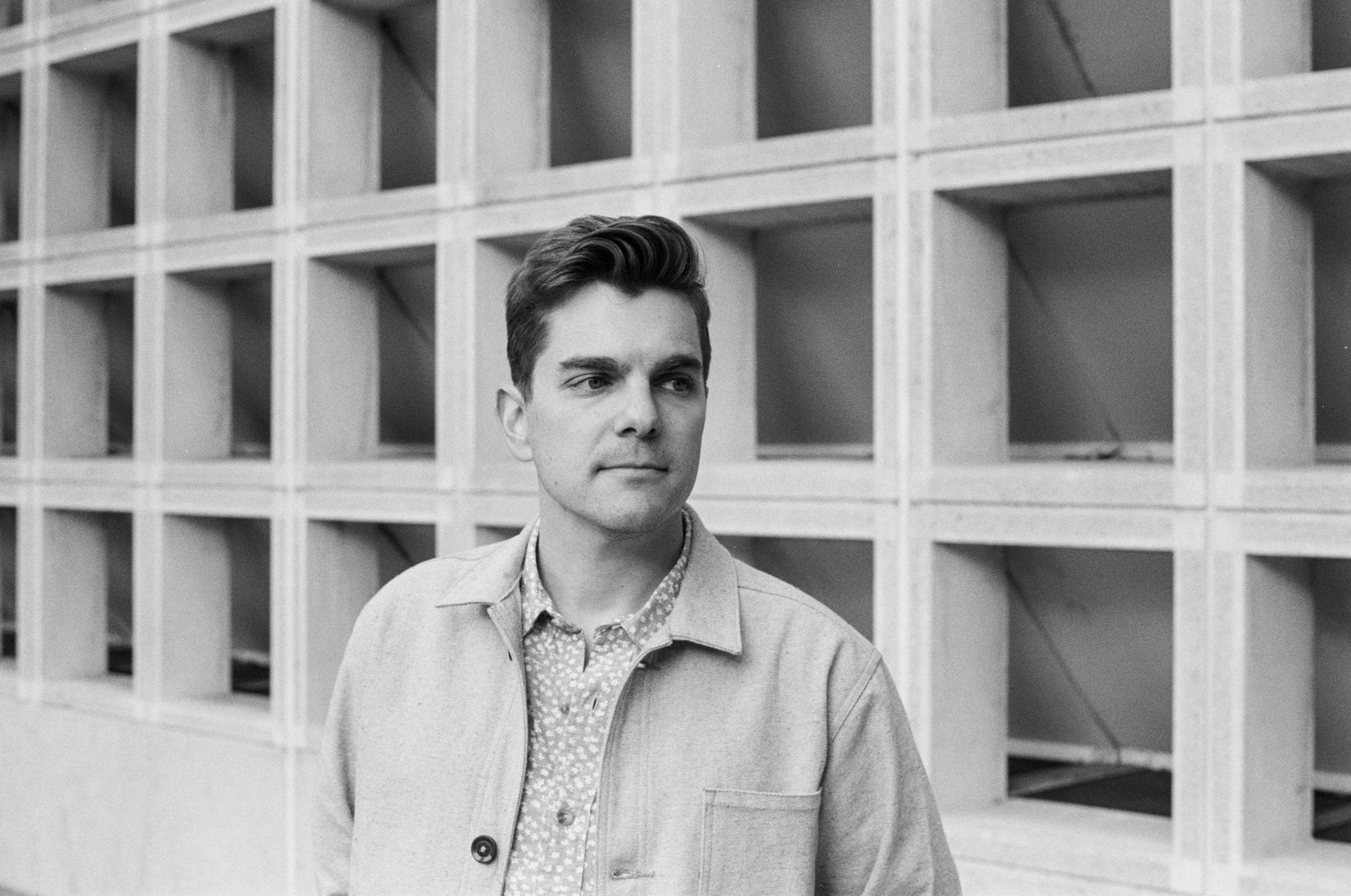Hey, readers. It’s great to be doing one of these again. I don’t do them as often as I’d like to, so when I get to writing about a great artist, I make sure they’re something truly special. Enter Makeunder, music project of singer, producer, and multi-instrumentalist Hamilton Ulmer. In true Everything Is Noise fashion, you’ll find that the music he creates eludes conventional genrefication, but you’ll find elements of R&B, art pop, soul, experimental, and some good old-fashioned rock. It’s tailor-made to get lost in and make you feel which renders Makeunder a perfect Weekly Featured Artist for us. Ulmer was gracious enough to talk to me about the band’s history, influences, and approach in preparation for this piece.
The origins of Makeunder are humble, but passionate. ‘I was kind of a weird, focused kid,’ Ulmer reminisces. ‘When I was 12, I decided after hearing an orchestra that I wanted to be a composer, so I found every book about composing and arranging music, every score I could find, and just poured myself into what I thought ‘composition’ meant – learning everything about how orchestral music worked on people’s emotions.’ This fixation on music evolved with some formal education for young Hamilton:
‘I went to an arts high school that had a music focus, so I learned music theory there and filled in some holes. So I guess you could say I have some training, but more of just a mania for music. After college, I jumped head-first into making music of all sorts, and that was ten years ago. I’ve gone through a lot of incredible highs and big lows since then. Never really saw myself as a singer, nor did I really like people looking at me that much. I have always been very shy and bookish. My brother is the flashy one, but he didn’t pursue music.‘
The ‘big lows‘ Ulmer refers to are well-documented, even within his own music. His father tragically succumbed to lung cancer in 2011. This became the thematic basis for Makeunder‘s second EP, Great Headless Blank, released in 2015. He reflects on the process which brought him to write the EP, returning to his childhood. ‘His death stirred up a lot in me that brought my attention back to how I was raised, looking for answers about how I got to this point in my life. When I was two, we moved from Humboldt County, California – known for being a place where you can go and do your own thing among the redwoods – to San Antonio, Texas, a pretty traditional working class town.’ The culture shock left Ulmer and his family in a fish-out-of-water situation, a feeling that comes across in Makeunder‘s sound.
Great Headless Blank is a complicated piece of music. Where you may expect it to rise, it falls or defiantly stagnates at its current tone. It’s vibrant and full in the face of the despair and grief its elements are sewn together with, utilizing a plethora of instruments and voices beyond Ulmer’s own. “Far from the Sober West” is an eclectic track, narrating a story of a family’s desperate journey to heal one of their own over psychedelic-esque, zig-zagging production, accented by saxophone and percussion. “Plain Tendency” shows him coming face-to-face with the Grim Reaper, surmounted by sadness at the loss of his father, and his father before him, evoking macabre details like their bodies being taken to an unmarked van. Lovely vocal harmonies act as a bed for Ulmer’s own blues-tinged crooning. We see the end of this particular chapter of Ulmer’s life with the final EP track “What a Lovely Bandsaw!” as his family sells everything necessary – ‘whatever it takes‘ – to leave San Antonio in their rear view. Which leads into Makeunder‘s more recent project, the debut album Pale Cicada.
‘I’ve been searching for the language to describe what was like growing up [in Texas], and Pale Cicada is the output,’ says Ulmer. ‘In some ways, it’s about growing up kind of poor. It took me a long time to understand that my family’s struggles were not unique, even if we were pretty one-of-a-kind. It helped to see my story in others, and gave me the courage to write about my past a bit more freely.’ It’s with this album that I not only discovered Makeunder, but became infatuated with the band. It’s a rich experience that sees Ulmer find his strongest footing yet. Of course, Pale Cicada is more than the sum of its parts – he explains:
‘It’s hard to pin down all the inspirations. I’ve been so immersed in music for so long, that a lot of my influences are under my skin in a way that I sometimes fail to understand until someone else points it out to me. Of course, given that I love orchestral music, I often lean on some of my favorite composers – Debussy, Ravel, Bartók, Stravinsky, Hindemith. Usually I reference these composers in oblique ways. Other times, directly.’
This circles back to how Ulmer grew up with music and how he chose to interact with it after that fated orchestra concert at age 12. Still, any studious person exploring music enough is sure to end up on the pop spectrum. As is common, we usually have our parents to thank for the music in our lives at a young age. ‘For more classic pop, I grew up with Earth, Wind and Fire and Marvin Gaye playing in my parent’s house so they inevitably find their way into my songs.’ He shouts out Dirty Projectors, Tune-Yards, and the mighty Thundercat as modern favorites and adds, ‘It’s so hard! My love of music makes both my listening and my output feel like a circus.’ Hey, I feel you there, Hamilton.
Of course, I couldn’t wait to gush about Pale Cicada, which only came out earlier this June. I, somewhat regrettably, didn’t review the album when it dropped, suffice it to say it’s worthy of heaps of praise as it has traversed the sharp inclined mountain that is my album of the year pile, nearly to the summit. This outing for Makeunder retains its established eclectic spirit, but focuses intently on melody and mood for a more proportioned feel than you may get from previous EPs. Though the themes and some sonic approaches are darkly tinted, much of this album rings upbeat with soul and heart the likes of which luminaries Prince and Stevie Wonder are capable of.
“Promethean Heat” is intimately wild, Ulmer’s cadence laced with a sultriness not found in much else of his work so far. The claps and stomps of the drums and other percussion hold hands with the primal, yet elegant tone of the track. Things are slowed down immensely elsewhere, like on the pensive “There’s Something That’s Moving in Me”. Here, the artist nostalgically serenades us over funky bass licks and wailing guitars that don’t overwhelm, but fill space nicely. He even calls forth comparisons to Peter Gabriel when he contends with late-stage capitalism on “In Between My Dead-End Jobs” in a way that should resonate strongly with the millennial mindset:
‘See, my eyes are glazing over as my focus sits on the truth
The world spins indifferently
I can’t get a break for nothing
It costs an arm and a leg
So I spend the youth that’s left in me‘
Pale Cicada helped Ulmer find – or at least convey – his musical phrase, or identity of sorts. He details:
‘Pale Cicada meets my desire for a musical phrase. Where I grew up in Texas, however, in the summer, you would hear thousands of cicadas screaming in the summer heat. So many aspects of Texas have spiritually informed me. Its unending flatness, its impossible heat, the sprawling highways, watching strip malls come and go and come and go. Texas provided all the material for my existential outlook.’
If you were to look at the liner notes of this album, you’d find a lot of musicians contributed to it. Ulmer shoulders quite a bit of weight himself – performing lead vocals, synths, keyboards, guitars, and general production – but enlists a number of people to assist with drums, clarinets, violins, trumpets, saxophones, and much more. ‘My music is quite challenging, so I have found it actually pretty easy to find talented people to work with since the music self-selects. Also, I’ve been making music for a while now, so I have a pretty good network of collaborators.’ Still, Ulmer strives to improve on each project from the last, even admitting he wished even Pale Cicada was a little shorter and more concise. He also seeks to learn from others that know better than him, progressing as an artist and producer in time.
It’s quite evident that Makeunder‘s music was made to feel, because the man behind it all has done nothing but put his own feeling into the music. I think the reason why I’m so entranced with this music especially is because it’s something that can envelope you, whether you want it to or not. This made up another element of intent behind the music for Ulmer. ‘I just want to give people a chance to get lost in an album,’ he says. ‘Everything is conspiring to keep you from getting lost these days. Spotify wants to control your taste. Everything is a distraction in a million other directions. I want to make music that pulls you out of yourself and your environment, even for just a little while, and gives you another world to explore apart from your own noisy one.’ Mission accomplished – this is pretty much how I myself would describe Pale Cicada.
Ulmer clearly has his own personal motivations for making and releasing music, though they are more functional than anything else. He likens it to necessity, invoking German composer Richard Strauss who wished to compose just ‘as a cow gives milk,’ adding that there’s ‘no real goal other than to feel something.’ Makeunder‘s next project will surely play into that necessity, perhaps literally and figuratively, as he’s aiming for a ‘party album for the climate catastrophe of the apocalypse.’ But for now? Ulmer’s indulging in a little #SelfCare, deservedly so. Unlike the impending doom our planet is hurtling toward, his personal apocalypse can wait.
Makeunder is…
Hamilton Ulmer – vocals, guitars, keys, synths, production
I want to give a big thanks to Hamilton for speaking with me about his work under the Makeunder name. I implore everyone to check out his music in case you found the numerous song embeds in this article to not be enough. You can always show your support with a purchase from Bandcamp, where you can find Pale Cicada out now via Good Eye Records and the rest of his independently released music. Be sure to give the band a follow on Facebook, Instagram, and Twitter!







